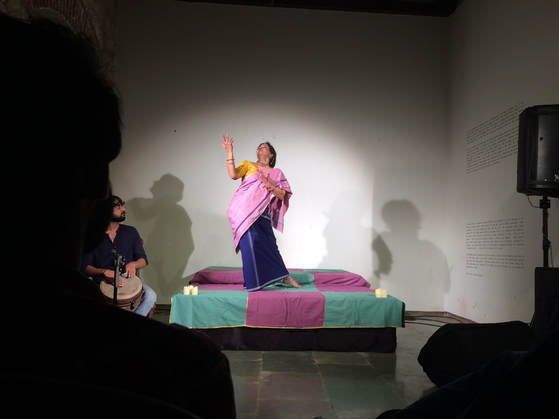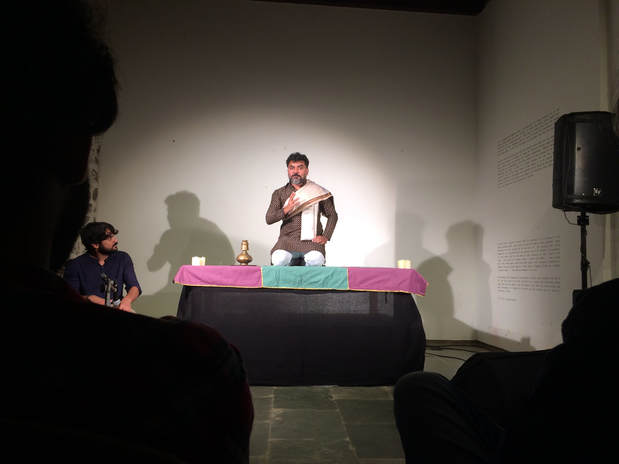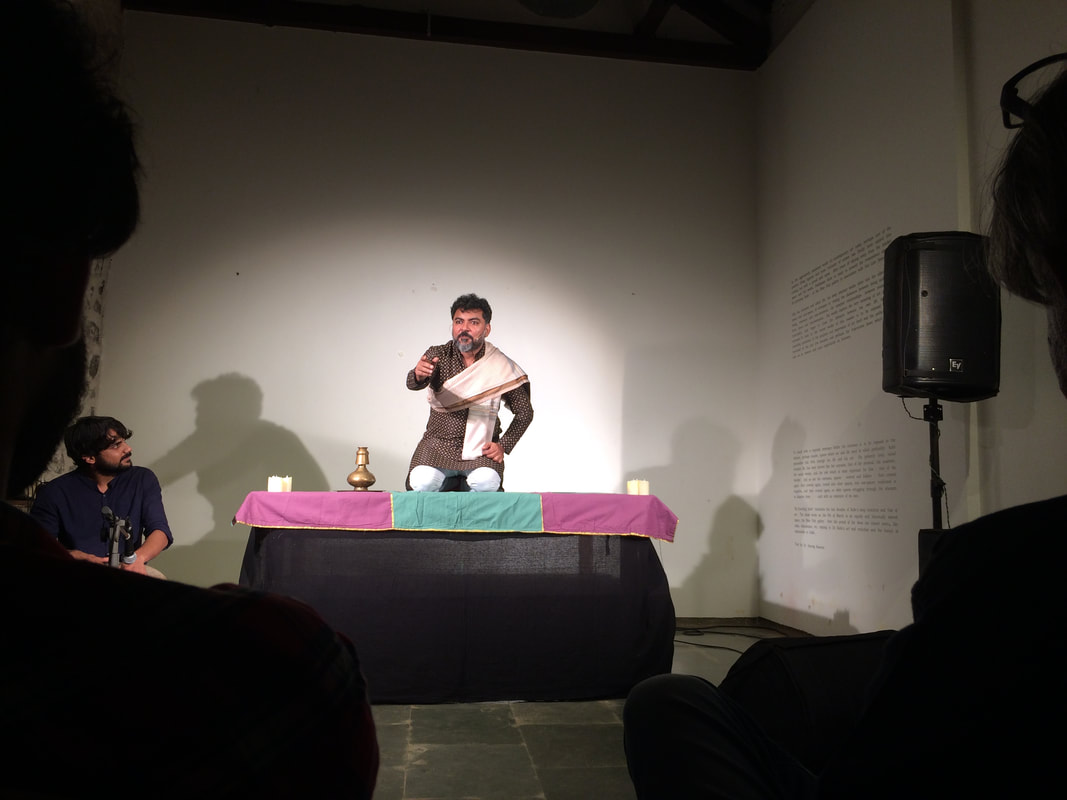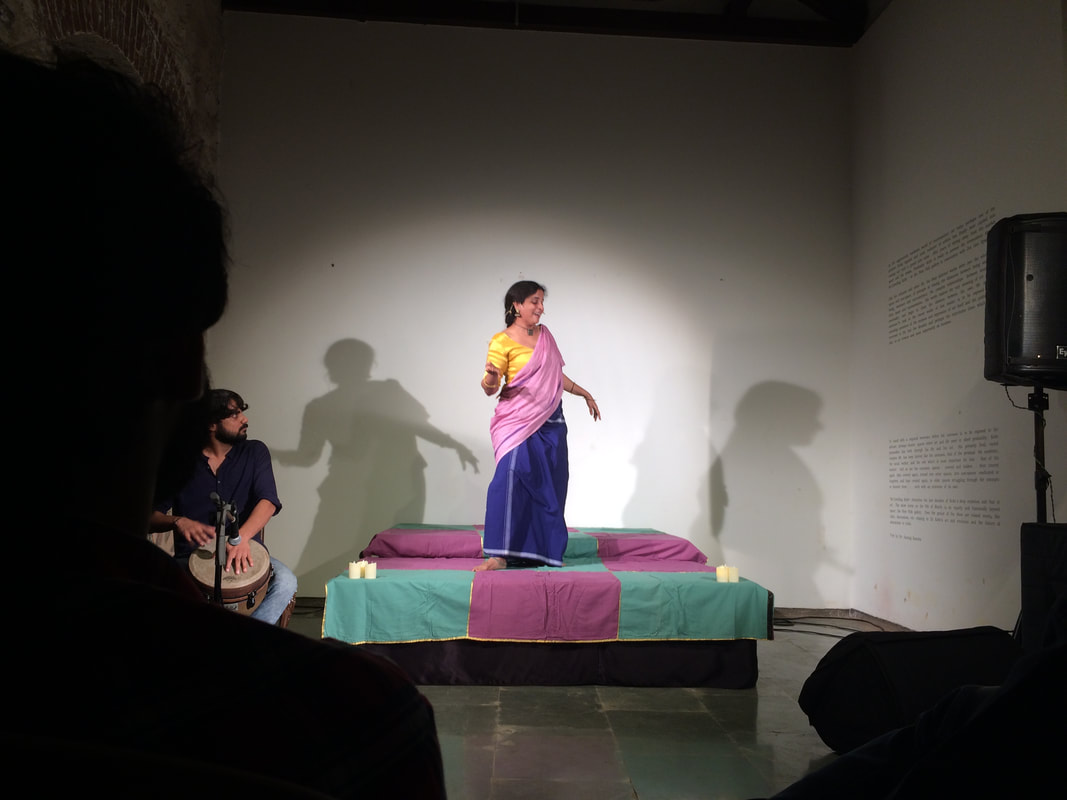|
After a low-key Onam sadya*, I'd a beautiful evening listening to storytelling, i.e. Qissebaazi in Urdu language. Theatre events in Mumbai used to be known for its punctuality. This is changing rapidly. Today's show got delayed nicely by 20 mins - when it comes to timing I am more Dutch than a Dutch citizen and I arrive 20 mins before time! Anyways, during this 40 mins waiting time I'd a chance to continue playing on phone 'Godot Godot' - with 8 year son of my friend. He acts Pozzo and I'm his Lucky .. This is my second blog on Qissebaazi already in three months! In May, while dealing with Mumbai summer wave, I'd watched for the first time Qissebaazi and I spontaneously became a fan. Since then I have been following this unique storytelling show in Mumbai, which is directed by Danish Husain under his production company, the Hoshruba Repertory. A few days ago, my nephew suggested a couple of indie Hindi films (a fact that I watched more Iranian & Latino films than Bollywood Hindi films) and one of the suggested films I happen to watch on Netflix was Ankhon Dekhi.. a nice surprise to see Husain in this film and to learn he is also a film actor. The two performances lined up for today's event at Hive, the Great Eastern Company, Byculla, Mumbai were in Malayalam and Urdu languages. The uniqueness in appreciating this art form of storytelling lies in the idea to bridge the culture gap breaking language barriers. To me Qissebaazi is one of the most creative form of art using storytelling in a culturally diverse country like India, particularly, more so in this current political scenario. All my indie documentaries under the Landing Together films are multilingual primarily to have a culture of language inclusivity - showcasing diverse ethnic tribal and indigenous peoples' languages bridge nature conservation. For example, when I use different tribal/adivasi languages in my film to narrate a social issue, it brings a deep cultural meaning with power wherein language is not just to share the information/ story, but to show how it shapes protagonist's opinions, perceptions, customs, and builds (or breaks) collective identities. Probably that's another reason why I am better able to connect with Qissebaazi's unique format. Danish Husain's justification to tell stories in different languages works well because of the way he understands his audience and uses creativity in executing the stories. He does so by dividing each story into two languages. A 'core' language is that of the text, and a symbolic 'bridge' language often either in Hindi or English that helps the audience to comprehend the story. By bringing stories in original language(s) in front of an urban-literate audience raises a crucial question about their 'languaculture adaptability' i.e. how do audience from culturally diverse background understand a story in a foreign language that belongs to another culture. Padma Damodaran, opened her story with a Malayalam poem - a tribute to Kerala's fishermen who extended their unconditional support in disaster rescue operations during the recent floods. She picked up a beautiful story, 'Wooden Dolls', written by Karoor Neelakantha Pillai - of course, none from the audience (including me, I was born after his death) knew this famous short story writer. I'm not elaborating the plot here. Padma kept her audience engaged till the end - using Malyalam as core and English as the bridge language. I liked the structure of today's programme wherein Danish did the introduction, followed by Padma's dance-song-story, and finally Danish wrapping up with a nice dastangoi/storytelling from Dastan-e-Amir-Hamza in bilingual - Urdu and Hindi. You might want to attend one of this storytelling events. On my way back home - two hours train journey - looking at August's beautiful Sturgeon full moon made me ponder on how nature and art has been separated in Mumbai's urban setting. I wish we can have some daredevil artists taking their art events to beaches, forts and mountain camps and pushing the urbanites out of their pigeon holes to enjoy theatre, storytelling, dance in relatively natural settings.... But, I doubt whether mainstream audience is ready to leave their popcorn comfort zone of watching commercial Bollywood films. At least I am exploring option to screen my films in open sky theatre.. or forests. Till then time to prepare for my short film screenings, including one in India at Vikalp@Prithvi, Prithvi theatre, Mumbai on Friday, 26/10. *Onam is a harvest festival originated and celebrated in the southern state of Kerala. Onam sadya is a typical traditional homemade food to celebrate this festival. @purabibose.com
0 Comments
Leave a Reply. |
Privacy Policy: We use Google Analytics to collect data to improve the Website. By using and accessing the website you are consenting to use of Google Analytics. All Rights Reserved.
ARchIvES
March 2019
CATEGORIES
All
Privacy Policy: This website uses Google Analytics to improve the Website. By using and accessing the website you are consenting to use of Google Analytics.
|




 RSS Feed
RSS Feed
